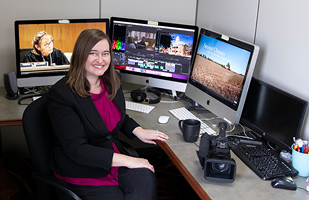‘Second Chances’ Drug Court Film Wins Emmy Award

Anne Fife, producer and editor of “Second Chances: One Year In Ohio’s Drug Courts,” won an Emmy during a virtual ceremony.

Anne Fife, producer and editor of “Second Chances: One Year In Ohio’s Drug Courts,” won an Emmy during a virtual ceremony.
The documentary film “Second Chances: One Year in Ohio’s Drug Courts” that reveals an up-close look at opioid addiction in three Ohio counties won an Emmy during the 56th annual Ohio Valley Regional Emmy Awards ceremony.
“Second Chances” and Anne Fife, its editor and producer, were honored in the best writing category. The awards were held virtually on Sunday night.
The one-hour film shows the complicated struggle of drug addiction and how courts play a crucial role in the recovery attempts of users, their families and communities.
Fife and her film crew spent an entire year chronicling 19 drug court participants in the counties of Medina, near Cleveland; rural Marion in north-central Ohio; and Hocking, in Appalachia.
“One thing I took away from this process was not to give up on people. There are many times that people surprised us by making small changes that really affected their lives in a positive way,” said Fife, who works for Ohio Government Television under contract with the Public Information Office of the Ohio Supreme Court.
“I’m incredibly proud that this documentary received this well-deserved recognition from the television industry,” Chief Justice Maureen O’Connor said. “This film captures the compassion and dedication of drug court judges and the treatment teams that help those struggling with addiction. The daily struggle of those suffering from the disease of addiction is real and it was accurately portrayed in this documentary.”
“Second Chances” was released in 2019 and distributed through public television stations, Court News Ohio and the National Center for State Courts. A link to the film resides on the Ohio Supreme Court and NCSC websites.
“This award comes at a time when the hard work of drug courts is less-recognized somewhat in the headlines due to the virus pandemic,” said Edward Miller, director of the Court’s Public Information Office and executive producer of the film. “That makes the film’s lessons and Anne Fife’s work all the more important to view today as addiction struggles continue.”
The film tells the opioid story entirely through the workings and words of the courts, the participants and community members. “There are no outside experts quoted, only those living through the drug crisis who are trying to solve it,” Miller said.


